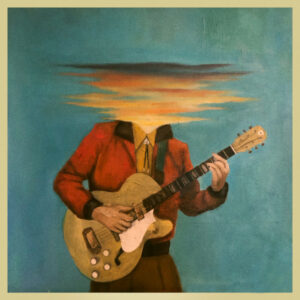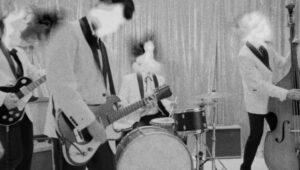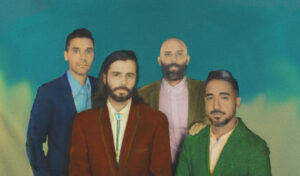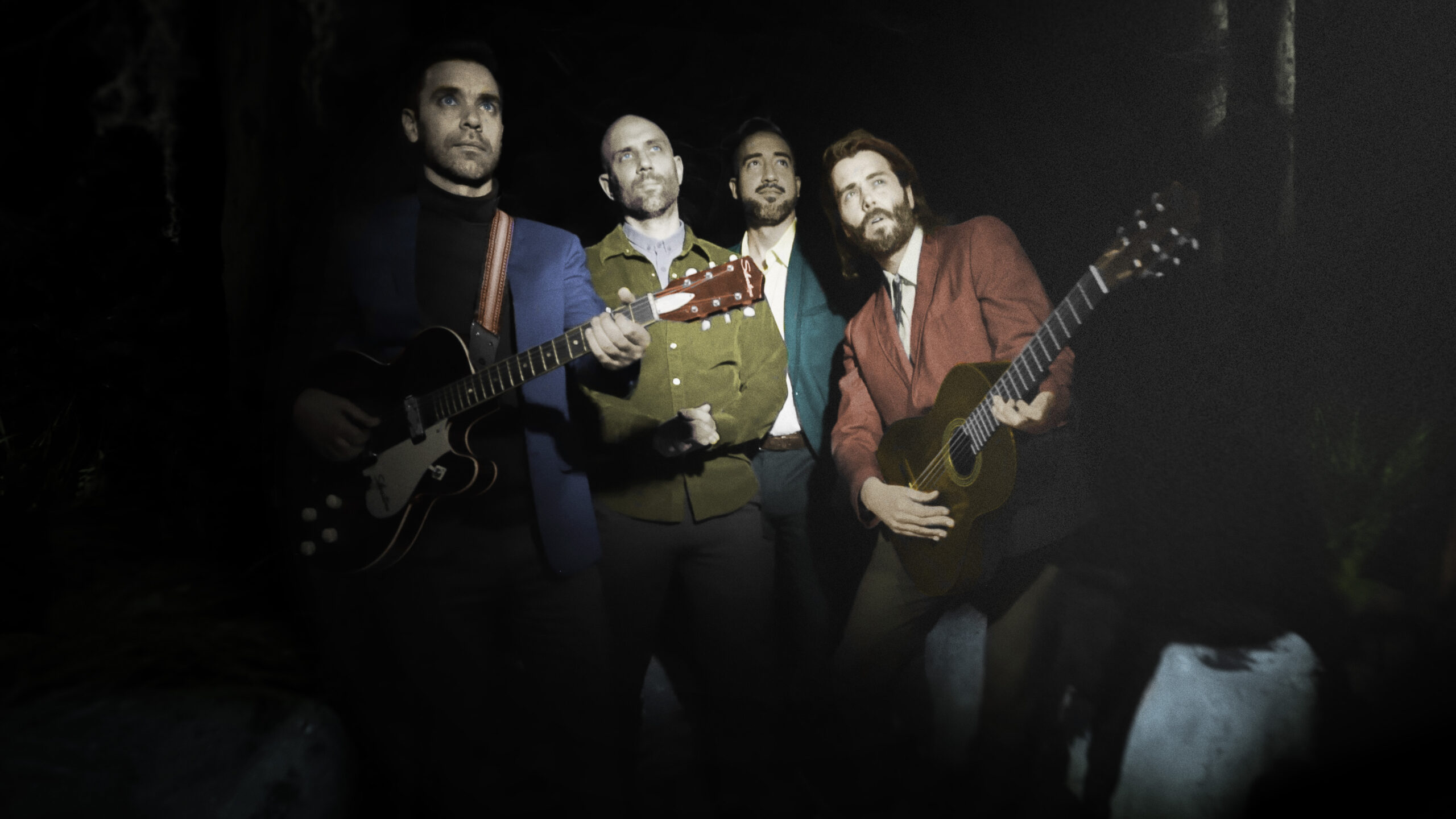 Foto-© Anthony Wilson
Foto-© Anthony Wilson
Der amerikanische Songwriter Ben Schneider und seine Lord Huron-Mitstreiter haben ein ausgewachsenes Faible für musikalische Bilderwelten, die vermögen den Hörer mit großer Geste und einem ganzen Sack voller Nostalgie und den damit verbundenen Emotionen in vergangenen Epochen zu versetzen. Für ihr gerade erst erschienenes Album Long Lost bediente sich die Band aus Los Angeles dabei ausgiebig bei musikalischen Vorbildern der frühen 60er, besonders von der damaligen Country-Szene – waren doch einige freundliche Geister aus just dieser Epoche während den Aufnahmen zugegen und beeinflussten diese, indem sie diesen lang verlorenen Album-Klassiker aus einem Parallel-Universum zur Wiedergeburt verhalfen. Wir sprachen mit Ben über die Aufnahmen, Musik als Nostalgie-Träger, die Geister, die sie riefen und vieles mehr…unser Interview!
Es ist früher morgen in LA als Ben kurz vor der Album-Veröffentlichung des neuen Lord Huron Video via Zoom zum Gespräch zugeschaltet ist. Er wirkt zufrieden und gewinnt auch den negativen Aspekten der immer noch anhaltenden Pandemie etwas Positives ab. So konnte die Band bei den Aufnahmen endlich eher einen Live-Ansatz ausprobieren, den sie zuvor aus Zeitgründen nie wählen konnten, durch die Verschiebung aufgrund von Engpässen bei der Vinyl-Produktion, konnte man sich Konzepte für Streaming-Formate ausdenken, die für eine Band mit solch einem wuchtigen Sound wie dem von Lord Huron und dem eigenen Anspruch gerecht werden. Und überhaupt, war das Timing-Glück der Band eh geneigt: „It kind of timed out pretty well, we had done most of the band tracking before and then we just were getting into the overdub stage, I think we had a pedal steel session booked on march 9th, which was right when the lockdown started here in Los Angeles. So that session was cancelled and the rest we had to do remotely. So the overdubbing, the orchestration and strings and that and the mixing was all done remotely during the pandemic. Strange way to make a record, finish a record, but you know, thankfully the stuff that required a lot of people getting together, the band tracking, was done before.“

Warum es dieses Mal gerade die Musik der 60er als klanglicher Pate für Lord Huron wurde, hängt dabei mit der Art der Emotionen, die die Band mit ihren Songs heraufbeschwören wollten, zusammen – wobei sich Ben sehr bewusst ist, wie er auf der Klaviatur der Emotionen der Hörer spielen und sich in der Bibliothek der Nostalgie bedienen kann. Der Zweck dabei – ohne großen Aufwand und ohne selbst die Songs mit einer Emotionalität aufladen zu müssen, kann man auf diesen Weg einfach ein Album mit tief verwurzelten Emotionen beladen: „I don’t know, I think I’m just a fan of music from all different time periods and what’s always interested me, is how you can use references from other times as some kind of a short hand, because you can borrow all the associations that people have from the past and use it in your own music. So when you do a sound that’s familiar with somebody or that recalls some music from the past, you also get all the emotions that they connect to that song, kind of for free, you know? Without having to put in all the work. So I’m not a big fan of just straight back throwback music, so music that’s just trying to imitate, but I really appreciate that kind of curation and borrowing from music of the past, because I think it’s a really powerful way to add depth to your music, because people have such strong emotions tied up with music from decades they don’t even remember or weren’t even alive during. So that’s what’s really my inspiration on that.“

Dafür erschuf die Band auch dieses Mal wieder ihre ganz eigenen 60iger Jahre und schlüpften in verschiedene Rollen, aus deren Perspektive sie ihre Songs schrieben: „I think a big part of it is, once I know what I’m writing a song about or who’s perspective I’m writing it from. There is no set process, it might start with the music or with the lyrics, but for explaining it, I’ll use the lyric example. If I know the message I try to put across lyrically, I kind of choose music elements that support that. So if it’s a song about being sad that your lover left you, then I will look at old songs that have the same feeling and what useful things you can borrow. But it’s also interesting to choose something that has an opposite meaning and see how this tension can add to the emotion. And everybody loves a sad song that sounds happy.“ Ein Charakter, dem dabei eine besondere Rolle zukommt auf dem Album, sowie während der Kampagne dazu, ist der fiktive Mr. Tubbs Tarbell, der immer wieder während den Livestream-Sessions aus dem Studio zu Wort kam: „Tubbs is kind the head ghost of the story, he kind of represents the producer or the owner of the studio and in addition to be a character we have written through he also is the host of our live stream show that we did for a few months, we were doing one a month. We wanted to do the live stream a bit differently, so we did this different takes on our old songs, where we performed it in a different way, doing new interpretations, also premiered some new stuff, but also had this host that you learn more about while the show goes on, about his background – just kind of a fun little tv show basically.“ Durch die Sessions konnte auch weiterhin Kontakt mit den Fans halten, was der Band sehr wichtig war: „We saw that people were jumping onto these streams right away and we felt it was a great way to keep in touch with the fans, as we couldn’t go on tour, but we are not that kind of band that just could set up me and my guitar in my living room or whatever. It’s great for some artists, but it’s definitely not our way. We opened up a phone line, where they could call and request songs, it really became this platform for people to ask us questions and tell us stories and thank us – it was really touching.“

Berühren will die Band auch mit ihren Songs, wofür sie in ihrer Musik das Konzept der Time Blur nutzten – was sich auch als Song-Titel Time’s Blur als finaler Song auf Long Lost wiederfindet und das perfekt zu unserer aktuellen Zeit passt, in der wir uns alle die vergangenen Pre-Pandemie-Zeit wieder zurück wünschen: „It’s just this general feeling of things gone by, this idea of Time’s Blur is what we call it, which is the last track of the record. It’s this idea of your memory slowly getting warped and blurred while the time passes. And that was the concept already before the pandemic and I’m sure it was such a huge event in everyones life that everything is colored by. But I feel like even though the concept was created before the pandemic, it’s been really colored and sort of heightened by what we have all gone through and that idea of things just been lost in the past, I think everybody is feeling that right now. You know nostalgia for times gone by, like only a year ago time gone by, when it was just a completely different world. And I think everybody is just holding their breath to see like the long term fallout, from small things like your favorite restaurant closing and never re-opening to the way relationships have changed, people you haven’t seen in years. So not by design, but by chance the themes of the record seam to pretty line up to the things that people are feeling right now.“ Warum er sich bei der Produktion der Lord Huron Alben immer für das Konzept-Album-Format entscheidet und welchen Wert er immer noch für das immer wieder diskutierte Album-Format überhaupt sieht, beschreibt er wie folgt: „I’ve always been drawn to records that have some kind of concept. For me the album is such a beautiful format, such a beautiful art form and some of the most important art that I’ve consumed in my life have been albums. And I just really think it’s a great format to work in, for me it’s the musical equivalent of a novel or a film. You get to play with multiple ideas over the course of an hour or so and you can thrive together a story. And I think the challenge is always to make sure that each of those bits can also stand on their own and can have a life of their own as a song, as it’s the reality of how people consume the music and how the radio works, they need to be stand on their own. But when you put them together, in the order that they are meant to be gone particularly, it creates this whole new, rich tapestry, of emotion and ideas and you can really take someone on a journey. In 45 minutes or an hour. And I know a lot of people keep saying „The album is dead“ or dying, but I think there will always be a lot of people that appreciate it and I think it’s worth the time to craft it. And to think about the order of the songs, the way they flow into one or the other, the way it starts, the way it ends. I love getting into all of that, because I really try to get people this feeling that I had listening to some of those well crafted records, which effected me so much. I just wanna try to recreate that for the people, because it’s such a great experience.“ Also eine Art Mixtape mit eigenen Songs? „It’s a great way to see it – like the ultimate mixtape with your own songs, that’s exactly how I think of it. Creating and crafting an experience for somebody, like you would with a mixtape or something for your girlfriend.“

Wenn man Long Lost als Mixtape begreift, ist I Lied zum Ende hin eins der absoluten Höhepunkte, die einen emotional noch mal unerwartet trifft und einen in emotionale Tiefen hinabzieht. Ein Song gewordenes, monumentales Opus an das nahende Ende einer Liebesbeziehung, aus Sicht beider Partner, gleichzeitig musikalisch extrem unaufgeregt, im 60ies Format-Radio-Country, während inhaltlich hoch aufreibend. „I started to think about this idea of a relation ship ending, not because I was going through it by myself, but seeing other people that I was close to, going through that kind of thing and also just imagining myself in that position, what it would be like. And I really like the idea of looking at it from both sides of the story. So I knew I wanted it to be a duet, where you kind of get the first partys look at it in the first couple of verses and then kind of a surprise to hear the next verses where it’s the other person and you see what that one has to say, so kind of a dialog, where kind of the whole song you keep thinking it’s one-sided, but then you get a surprise-perspective from the other side. So I knew I wanted it to be a duet and I was looking for the right singer the help us with that, as I wanted to sound in a certain way and have someone that has a certain character in her voice, like those old country duets that were so powerful.“ Die perfekte Duett-Partnerin fand man in der texanischen Songwriterin Allison Ponthier: „Our publisher introduced us to this singer Allison Ponthier, who has a record coming out later this year, but who is just kind of getting started and I just loved her voice, and we met up and she just had a very similar sensibility to me and we became friends really quickly. So now she’s been hanging out at the studio, she recorded that, we’ve been making videos together…so it worked out really well and she did a great performance on that song.“
Ein einschneidender Meilenstein in der Geschichte der Band war sicherlich die zentrale Platzierung von The Night We Met in der ersten Staffel der Netflix-Serie Tote Mädchen Lügen Nicht – wobei Serien- und Film-Platzierungen für Lord Huron laut Ben eh essentiell sind, da sich ihre Songs nicht wirklich für Radio-Plays anbieten…und trotzdem denkt er, dass der Erfolg des Songs, der mit über 750 Millionen Streams allein bei Spotify schon signifikant aus der Diskographie der Band herausragt, die eigene Erwartung und den eigenen Anspruch nicht groß verändert hat: „Honestly not much, it was interesting timing, it definitely brought us a lot of new fans, which is great, as we have to think of tv and movie placements, as we don’t get played on the radio a whole lot. So that’s our way to reach a bunch of people, getting this nice placements. But we already had kind of established a pretty healthy fan base and we had a really strong touring and the records were doing well – so thankfully we weren’t relying onto this one song to keep us going. So we didn’t feel a whole lot of pressure to recreate it right away or to do the same thing again, I mean having another song that’s as big as that one would be great, but we don’t feel like the pressure to make that happen necessarily or so. We have a really great fan base that I think seams really loyal and into it and not necessarily looking for another hit-record. I don’t know…if anything, it just was giving us the freedom to keep doing what we like to do, without having to worry to much about it. We just carry on making that kind of records that we are making. The record label trusts us and stays out of our business for the most part and let’s us do our thing…so can’t complain.“










